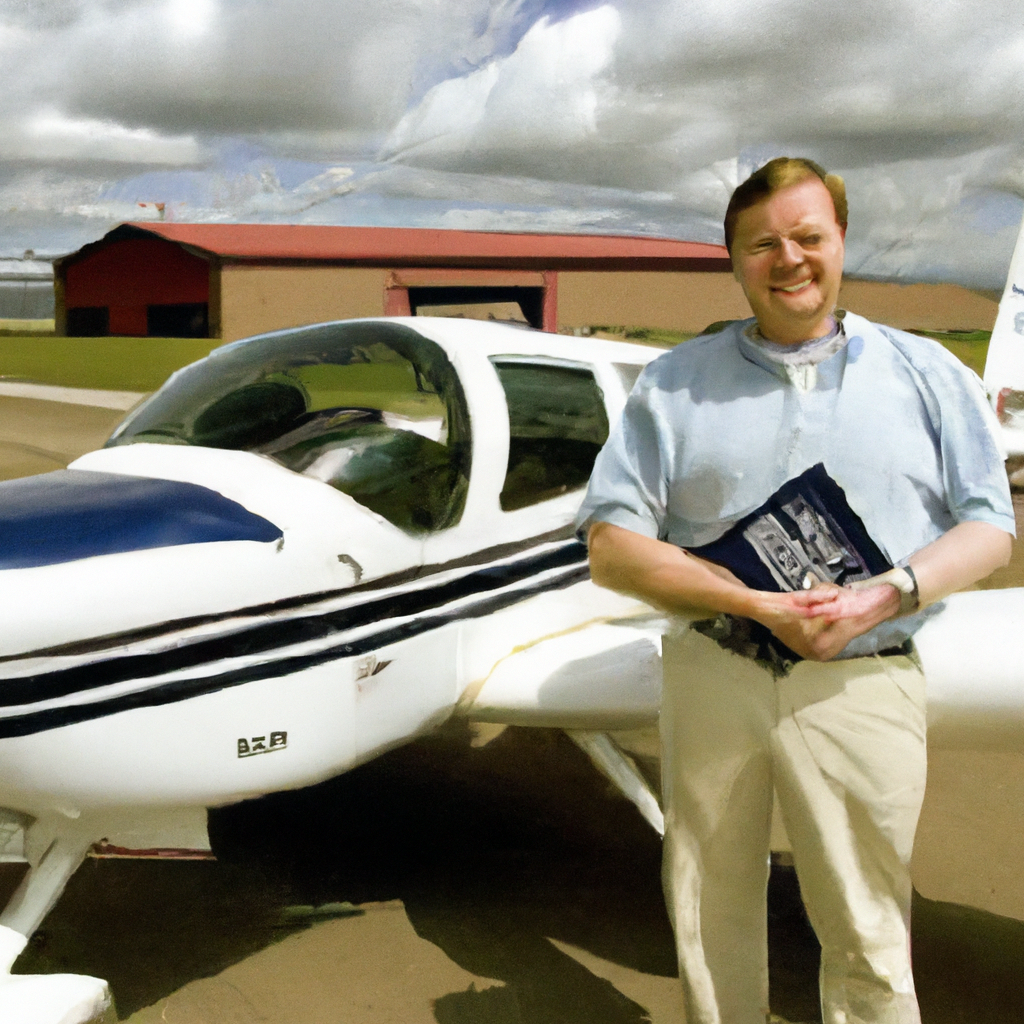
Looking to pursue your dreams of becoming a pilot? Look no further than the GI Bill, which has been instrumental in turning the aspirations of countless veterans into a reality in the field of aviation. The GI Bill offers financial support and educational benefits to veterans, helping them to obtain the necessary training and licenses required for a successful career in flying. In this article, we will explore the ways in which the GI Bill has opened doors and provided opportunities for aspiring pilots, highlighting the benefits and opportunities that await those who have served in the military.

Learn More About Purchasing Options
Overview
What is the GI Bill?
If you are a veteran or a dependent of a veteran and have dreams of becoming a pilot, the GI Bill can play a significant role in making your dreams a reality. The GI Bill is a comprehensive education benefits program that provides financial assistance to eligible individuals who have served in the military. It was created to help veterans transition into civilian life by offering them the opportunity to pursue higher education or vocational training.
Why choose aviation?
Aviation is an exciting and rewarding career path that offers a wide range of opportunities. Whether you aspire to be a commercial pilot, a helicopter pilot, or even a military pilot, the aviation industry has something to offer for everyone. Choosing aviation as a career allows you to travel the world, experience new cultures, and constantly challenge yourself. It is a field that combines technical skills, critical thinking, and a passion for flight. With the growing demand for pilots, there has never been a better time to enter the aviation industry.
How the GI Bill can help aspiring pilots
The GI Bill provides a range of benefits that can greatly assist aspiring pilots in pursuing their aviation education and training. From covering tuition fees to providing a monthly stipend, the GI Bill can significantly reduce the financial burden of aviation training. It can also provide support for other education-related expenses such as books, supplies, and housing. By utilizing the GI Bill benefits, aspiring pilots can focus on their training without having to worry about the financial aspect, allowing them to fully immerse themselves in their aviation education and set themselves up for success in their careers.
Eligibility for GI Bill Benefits
Active duty veterans
Active duty veterans who have served at least 90 days of active duty after September 10, 2001, are generally eligible for the Post-9/11 GI Bill. However, the level of benefits an individual is entitled to depends on the length of their service. For example, veterans who have served at least 36 months of active duty are eligible for 100% of the benefits, while those with less than 36 months are eligible for a percentage based on their length of service.
Reservists and National Guard members
Reservists and National Guard members may also be eligible for GI Bill benefits. The specific benefits they are entitled to depend on the type and duration of their service. Reservists who have been called to active duty and served a minimum of 90 days after September 10, 2001, are eligible for the Post-9/11 GI Bill, similar to active duty veterans. On the other hand, reservists and National Guard members who have not been called to active duty may be eligible for the Montgomery GI Bill or other education assistance programs.
Dependents of veterans
Dependents of veterans may also be eligible for GI Bill benefits under certain circumstances. The Post-9/11 GI Bill allows veterans to transfer their education benefits to their dependents if they have served at least 6 years in the military and agree to serve an additional 4 years. This transferability option provides an excellent opportunity for dependents to pursue their education and training, including aviation programs.
Get Started With Your Purchase
Types of GI Bill Programs
Post-9/11 GI Bill
The Post-9/11 GI Bill is one of the most popular GI Bill programs and provides excellent benefits for aviation education. This program covers not only tuition fees but also provides a monthly housing allowance and a stipend for books and supplies. The amount of benefits varies depending on the level of service, with veterans who have served 36 months or more being eligible for the maximum benefits.
Montgomery GI Bill
The Montgomery GI Bill is another option for veterans who wish to pursue aviation education. Unlike the Post-9/11 GI Bill, the Montgomery GI Bill requires veterans to pay a monthly contribution toward their education benefits during their first year of service. However, it provides a monthly stipend that can be used to cover aviation training expenses. The amount of benefits depends on the individual’s length of service and educational program.
Reserve Educational Assistance Program (REAP)
The Reserve Educational Assistance Program (REAP) is available for reservists and National Guard members who have been called to active duty in response to a war or national emergency. This program provides educational assistance for up to 36 months, including funding for aviation programs. The amount of benefits depends on the length of service and the type of educational program.
Veterans Educational Assistance Program (VEAP)
The Veterans Educational Assistance Program (VEAP) is a program for veterans who entered active duty between January 1, 1977, and June 30, 1985, and made contributions toward their education benefits. While VEAP does not directly cover aviation training expenses, veterans can use the benefits received to fund their aviation education. The specific amount of benefits depends on the contributions made by the individual during their service.
Using GI Bill Benefits for Aviation Education
Selecting an eligible aviation program
To utilize GI Bill benefits for aviation education, it is important to select an eligible aviation program. Not all flight schools or aviation training centers may be approved for GI Bill benefits. It is crucial to research and ensure that the aviation program you choose is accredited and meets the requirements set by the Department of Veterans Affairs (VA). The VA has a list of approved aviation programs that are eligible for GI Bill benefits, making it easier for veterans to find suitable options.
Flight training vs. traditional education
When it comes to utilizing GI Bill benefits for aviation education, one of the key decisions to make is whether to pursue flight training or traditional education. Flight training focuses specifically on developing the skills required to become a pilot, while traditional education programs, such as aviation management or aviation technology, offer a broader understanding of the aviation industry. Both options have their merits, and it ultimately depends on your career goals and aspirations. If you are solely interested in becoming a pilot, flight training may be the right path for you.
Benefits coverage for aviation training
Aviation training can be costly, and the GI Bill benefits can greatly alleviate the financial burden. The GI Bill generally covers the tuition and fees for approved aviation programs. Additionally, the Post-9/11 GI Bill provides a monthly housing allowance that can be used to cover housing expenses during your aviation training. It also offers a stipend for books and supplies, ensuring that you have the necessary resources for your aviation education. By utilizing these benefits, you can focus on your training and excel in your aviation career.

Benefits of Pursuing Aviation with GI Bill
Reduced financial burden
One of the most significant benefits of pursuing aviation education with the GI Bill is the reduced financial burden. Aviation training can be expensive, with flight hours, simulator sessions, and other training costs adding up quickly. The GI Bill coverage for tuition and fees, as well as the housing allowance and stipend, can significantly reduce your out-of-pocket expenses. This allows you to focus on your training without the constant worry of finances, making it easier to excel in your aviation education.
Accelerated career progression
By utilizing the GI Bill benefits for aviation education, you are setting yourself up for accelerated career progression. Aviation is a competitive industry, and having the necessary qualifications and training can give you an edge over other candidates. With the GI Bill providing the financial support you need for your aviation education, you can complete your training quickly and efficiently, allowing you to enter the job market sooner. This can lead to faster career progression and more opportunities in the aviation industry.
Access to advanced aviation training
Aviation is a constantly evolving field, and it is essential for pilots to stay updated with the latest advancements and technologies. Utilizing the GI Bill benefits for aviation education provides you with access to advanced training programs and cutting-edge facilities. Whether it is training on state-of-the-art simulators or learning about new navigational systems, the GI Bill ensures that you have the resources and support to receive the best possible aviation education. This knowledge and experience can give you a competitive advantage in your aviation career.
Choosing the Right Flight School
Accreditation and certifications
When choosing a flight school, it is crucial to consider accreditation and certifications. Look for flight schools that are accredited by recognized aviation organizations and have a positive reputation in the industry. Accreditation ensures that the flight school meets certain standards of quality and has undergone thorough evaluations. Additionally, certifications from regulatory bodies such as the Federal Aviation Administration (FAA) demonstrate that the school meets the required safety and training standards.
Flight instructor qualifications
The qualifications and experience of flight instructors at a flight school should also be taken into consideration. Experienced and knowledgeable instructors play a vital role in providing a quality aviation education. Research the instructor-to-student ratio at the flight school and inquire about the experience and qualifications of the instructors who will be training you. A school with highly skilled instructors can greatly enhance your learning experience and ensure that you receive top-notch training.
Facilities and aircraft fleet
Inspect the facilities and aircraft fleet of the flight school before making a decision. Ensure that the school has well-maintained aircraft that are suitable for training purposes. The condition of the aircraft fleet directly impacts the quality of your training and the overall safety of your aviation education. Additionally, look for modern training facilities equipped with up-to-date technology and resources. A flight school with excellent facilities and a diverse aircraft fleet can provide a comprehensive and immersive aviation education experience.
Applying for GI Bill Benefits
Understanding the application process
To apply for GI Bill benefits, you must first complete the application process. The application process typically involves filling out the necessary forms and providing supporting documentation to verify your eligibility. The Department of Veterans Affairs (VA) is responsible for processing GI Bill applications, so it is important to follow their guidelines and instructions. The VA website provides detailed information on how to apply for GI Bill benefits, including step-by-step instructions and resources.
Documentation and requirements
When applying for GI Bill benefits, you will need to provide certain documentation and meet specific requirements. This may include proof of military service, such as your DD-214 form, as well as proof of enrollment in an eligible aviation program. The specific documentation and requirements may vary depending on the type of GI Bill program you are applying for. It is essential to carefully review the eligibility criteria and gather all the necessary documentation to ensure a smooth application process.
Deadlines and timelines
Keep in mind that there may be deadlines and timelines associated with applying for GI Bill benefits. It is important to submit your application and required documentation within the specified timeframe to avoid any delays or complications. The VA website and the GI Bill support team can provide information on the deadlines and timelines for different GI Bill programs. Staying organized and proactive throughout the application process will help ensure that you receive your benefits in a timely manner.
Additional Financial Aid Options
Scholarships for aspiring pilots
In addition to GI Bill benefits, there are several other financial aid options available for aspiring pilots. Scholarships specifically designed for aviation students can provide valuable funding for your aviation education. Many aviation organizations, private foundations, and educational institutions offer scholarships to support deserving students pursuing a career in aviation. These scholarships can help cover tuition fees, flight training costs, and other education-related expenses. Research and apply for scholarships that align with your aviation goals and aspirations.
Government grants for aviation training
Government grants are another option to consider when seeking financial aid for aviation training. Various federal and state agencies offer grants to students pursuing specific fields, including aviation. These grants are typically based on financial need or academic merit and can provide a significant contribution towards your aviation education expenses. Explore government grant opportunities through the Department of Education’s website or by contacting your state’s education department for more information.
Loan options for flight training
In some cases, you may need to explore loan options to further support your aviation education. While loans require repayment, they can provide immediate financial assistance to cover your training expenses. Many banks and private lending institutions offer specialized loans for flight training. It is important to carefully consider the terms and interest rates associated with these loans before making a decision. Ensure that you have a clear plan for repayment and that you are confident in your ability to meet the loan obligations.
Success Stories of GI Bill-supported Pilots
Experiences of veterans turned pilots
Many veterans have successfully transitioned into the aviation industry with the help of the GI Bill. Their experiences serve as inspiring success stories that highlight the role of the GI Bill in making their pilot dreams a reality. From former military aviators who continued their aviation education to veterans who pursued flight training for the first time, the GI Bill has provided the necessary support and resources needed to embark on successful aviation careers. These success stories showcase the opportunities and possibilities that await those who choose to pursue aviation with the help of the GI Bill.
Career achievements with aviation training
The aviation industry offers numerous career opportunities and the potential for significant achievements. Pilots who have received their aviation training through the GI Bill have gone on to accomplish remarkable feats and secure fulfilling careers. From flying for major airlines to becoming instructors or even starting their own aviation businesses, the possibilities are endless. The GI Bill provides the foundation for these achievements by providing the necessary education and training, allowing pilots to pursue their passion and excel in their careers.
FAQs about GI Bill and Aviation
Is flight training covered by the GI Bill?
Yes, flight training is covered by select GI Bill programs. The Post-9/11 GI Bill, Montgomery GI Bill, and Reserve Educational Assistance Program provide benefits that can be used towards flight training expenses. However, it is important to note that not all flight schools or aviation programs may be approved for GI Bill benefits. It is essential to select an eligible aviation program and ensure that it meets the requirements set by the Department of Veterans Affairs (VA).
How long does GI Bill benefits last?
The duration of GI Bill benefits varies depending on the specific program and the length of service. The Post-9/11 GI Bill generally provides benefits for up to 36 months, while the Montgomery GI Bill and Reserve Educational Assistance Program often have a shorter duration. It is crucial to understand the specific terms and timeline of your chosen GI Bill program to make the most of your benefits.
Can you transfer GI Bill benefits to dependents?
Yes, under certain circumstances, veterans can transfer their GI Bill benefits to their dependents. The Post-9/11 GI Bill allows veterans to transfer their education benefits if they have served at least 6 years in the military and agree to serve an additional 4 years. The transferability option provides an excellent opportunity for dependents to pursue their education and training, including aviation programs. It is important to carefully review the guidelines and requirements for transferring GI Bill benefits to dependents and consult with the Department of Veterans Affairs for further information.
In conclusion, the GI Bill offers a valuable opportunity for veterans and their dependents to pursue aviation education and training. Whether you choose flight training or a traditional aviation education program, the GI Bill benefits can greatly reduce the financial burden and provide the necessary support for a successful aviation career. By understanding the eligibility requirements, choosing the right flight school, and utilizing additional financial aid options, you can turn your pilot dreams into a reality with the help of the GI Bill. So, take the leap and embark on an exciting journey in the aviation industry today!

